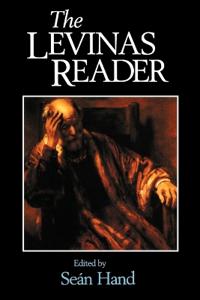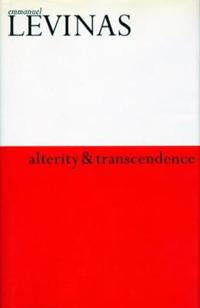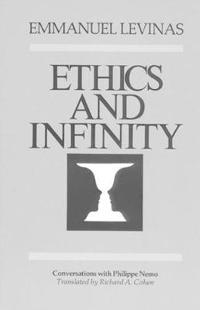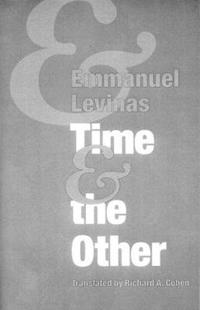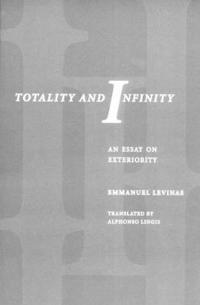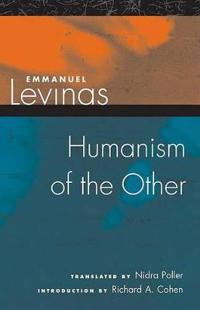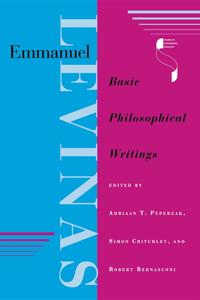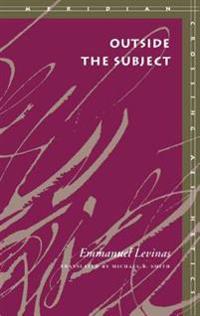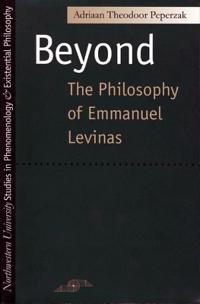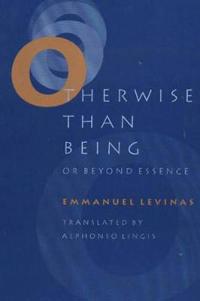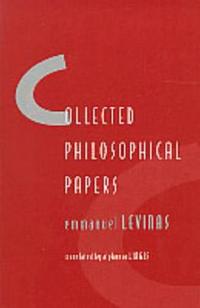The Levinas Reader (Häftad)
avSean Hand, Emmanuel Levinas, Hand
ISBN: 9780631164470 - UTGIVEN: 200102Emmanuel Levinas has been Professor of Philosophy at the Sorbonne and the director of the Ecole Normale Israelite Orientale. Through such works as "Totality and Infinity" and "Otherwise than Being", he has exerted a profound influence on twentieth-century continental philosophy, providing inspiratio[...]
Alterity and Transcendence (Pocket)
avEmmanuel Levinas, Michael B. (TRN) Smith, Emmanuel Levinas
ISBN: 9780231116510 - UTGIVEN: 2001-03Internationally renowned as one of the great French philosophers of the twentieth century, the late Emmanuel Levinas remains a pivotal figure across the humanistic disciplines for his insistence -- against the grain of Western philosophical tradition -- on the primacy of ethics in philosophical inve[...]
Nine Talmudic Readings (Pocket)
avEmmanuel Levinas, Annette (TRN) Aronowicz, Emmanuel Levinas
ISBN: 9780253208767 - UTGIVEN: 1994-02oI know of no work that more readily opens this classic of Judaic learning to the general reader.O NThe Key Reporter oThe appearance in English of nine of LevinasOs essays on talmudic discourse, collected and beautifully translated by Aronowicz, is an important occasion...These essays are crucial to[...]
Difficult Freedom (Pocket)
avEmmanuel Levinas, Sean (TRN) Hand, Emmanuel Levinas
ISBN: 9780801857836 - UTGIVEN: 1997-10Jean Paul Sartre hailed him as the philosopher who introduced France to Husserl and Heidegger. Derrida has paid him homage as "master." An original philosopher who combines the insights of phenomenological analysis with those of Jewish spirituality, Emmanuel Levinas has proven to be of extraordinary[...]
Ethics and Infinity (Pocket)
avEmmanuel Levinas, R. Cohen, Emmanuel Levinas
ISBN: 9780820701783 - UTGIVEN: 198503Levinas brings together the phenomenology of Husserl, the fundamental ontology of Heidegger, and the Bible. This book highlights his modesty and reserve and, above all, his rigor. It is the best introduction' to his work. Chapters Include: Bible and Philosophy; Heidegger; The 'There Is'; The Solitud[...]
Time and the Other (Pocket)
avEmmanuel Levinas, Richard A. Cohen, Emmanuel Levinas
ISBN: 9780820702339 - UTGIVEN: 199005Emmanuel Levinas is a major voice in twentieth century European thought. Beginning his intellectual career in the 1920s, he has developed an original and comprehensive post rationalist ethics of social responsibility and obligation. The influence of his work has already been profound and far-reachin[...]
Totality and Infinity (Pocket)
avEmmanuel Levinas, Alphonso Lingis, Emmanuel Levinas
ISBN: 9780820702452 - UTGIVEN: 196908First published in English by Duquesne in 1969, this has become one of the classics of modern philosophy.[...]
Entre Nous (Häftad)
avEmmanuel Levinas
ISBN: 9780231079112 - UTGIVEN: 200005Emmanuel Levinas is one of the most important figures of twentieth-century philosophy. Exerting a profound influence upon such thinkers as Derrida, Lyotard, Blanchot, and Irigaray, Levinas's work bridges several major gaps in the evolution of continental philosophy -- between modern and postmodern, [...]
Humanism of the Other (Pocket)
avEmmanuel Levinas, Nidra Poller, Richard A. Cohen
ISBN: 9780252073267 - UTGIVEN: 200510In "Humanism of the Other", Emmanuel Levinas argues that it is not only possible but of the highest exigency to understand one's humanity through the humanity of others. In paperback for the first time, Levinas's work here is based in a new appreciation for ethics and takes new distances from phenom[...]
Emmanuel Levinas (Häftad)
avAdriaan Theodoor Peperzak, Simon Critchley, Robert Bernasconi
ISBN: 9780253210791 - UTGIVEN: 1996-06Emmanuel Levinas (1906D1996) has exerted a profound influence on 20th-century continental philosophy. This anthology, including Levinas's key philosophical texts over a period of more than forty years, provides an ideal introduction to his thought and offers insights into his most innovative ideas. [...]
Emmanuel Levinas (Inbunden)
ISBN: 9780415107303 - UTGIVEN: 1995-06This is a study of Levinas's work. Following his philosophical works in roughly chronological order, it shows how Levinas's argument - that metaphysics is anarchically ethical - departs from the tradition culminating with Hegel from the thinking of contemporaries like Husserl and Heidegger. He exami[...]
Emmanuel Levinas (Storpocket)
avSean Hand
ISBN: 9780415402750 - UTGIVEN: 200809Best known for his theories of ethics and responsibility, Emmanuel Levinas was one of the most profound and influential thinkers of the last century. In this clear, accessible guide, Sean Hand examines why Levinas is increasingly fundamental to the study of literature and culture today.Exploring the[...]
Emmanuel Levinas and the Limits to Ethics (Inbunden)
ISBN: 9780415843317 - UTGIVEN: 2013-12Emanuel Levinas and the Limits to Ethics highlights how radically different Jewish ethics is from Christian ethics, and the profound affinities that subsist between Jewish ethics and philosophical and political liberalism. The philosophy of Emmanuel Levinas has captured the imagination of a global c[...]
The Cambridge Introduction to Emmanuel Levinas (Pocket)
avMichael L. Morgan
ISBN: 9780521141062 - UTGIVEN: 201103This book provides a clear and helpful overview of the thought of Emmanuel Levinas, one of the most significant and interesting philosophers of the late twentieth century. Michael L. Morgan presents an overall interpretation of Levinas' central principle that human existence is fundamentally ethical[...]
Outside the Subject (Häftad)
avEmmanuel Levinas
ISBN: 9780804721998 - UTGIVEN: 1994-12One of the most influential philosophers of our day has selected 16 previously uncollected pieces that are unified by Levinas's project of revising the phenomenological description of the world in light of our experience of other persons.[...]
Proper Names (Häftad)
avEmmanuel Levinas
ISBN: 9780804723527 - UTGIVEN: 1997-02Combining elements from Heidegger's philosophy of "being-in-the-world" and the tradition of Jewish theology, Levinas has evolved a new type of ethics based on a concept of "the Other" in two different but complementary aspects. He describes his encounters with those philosophers and literary authors[...]
Of God Who Comes to Mind (Häftad)
avEmmanuel Levinas
ISBN: 9780804730945 - UTGIVEN: 1998-07The thirteen essays collected in this volume investigate the possibility that the word "God" can be understood now, at the end of the twentieth century, in a meaningful way. Nine of the essays appear in English translation for the first time. Among Levinas's writings, this volume distinguishes itsel[...]
Adieu to Emmanuel Levinas (Häftad)
avJacques Derrida
ISBN: 9780804732758 - UTGIVEN: 199908A major philosophical event - new writings by Derrida on Levinas.
God, Death and Time (Häftad)
avEmmanuel Levinas
ISBN: 9780804736664 - UTGIVEN: 200103Transcripts from two lecture courses, delivered in 1975-76, explaining Levinas's thought with clarity and intensity.[...]
On Escape (Häftad)
avEmmanuel Levinas
ISBN: 9780804741408 - UTGIVEN: 200304First published in 1935, this work represents Emmanuel Levinas' first attempt to break with the ontological obsession of the Western tradition. In it, Levinas not only affirms the necessity of an escape from being, but also gives a meaning and a direction to it. Beginning with an analysis of need no[...]
The Ethics of Emmanuel Levinas (häftad)
ISBN: 9780804759434 - UTGIVEN: 2008-08Too often, Levinas's thought is distanced from traditional ethical enterprises, especially from normative ethics. It is put into the service of directly normative ends such as a call for respect for women or disadvantaged social groups, or for new normative understandings of the relation of doctors [...]
Beyond the Philosophy of Emmanuel Levinas (Häftad)
avAdriaan Theodoor Peperzak
ISBN: 9780810114814 - UTGIVEN: 1998-04Although Emmanuel Levinas is widely respected as one of the classic thinkers of our century, the debate about his place within Continental philosophy continues. In "Beyond: The Philosophy of Emmanuel Levinas, " Adriaan Theodoor Peperzak shows Levinas's thought to be a persistent attempt to point bey[...]
Otherwise Than Being (Pocket)
avEmmanuel Levinas
ISBN: 9780820702995 - UTGIVEN: 199805A sequel to Levinas's Totality and Infinity, this work is generally considered Levinas's most important contribution to the contemporary debate surrounding the closure of metaphysical discourse, much commented upon by Jacques Derrida. This work contains a fundamentally original theory of the ethical[...]
Collected Philosophical Papers (Pocket)
avEmmanuel Levinas
ISBN: 9780820703060 - UTGIVEN: 199808This collection, now available in an affordable paperback edition, contains eleven of the most significant articles written by Emmanuel Levinas. One of the most important philosophers of the phenomenological-existential tradition, Levinas further explored and developed each of his theses in the clas[...]

